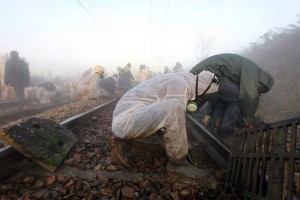 On Monday, November 28th, at about 10pm and after a transport of nearly 5 and a half days from Normandy in France, the thirteenth delivery of radioactive waste in Castor containers reached the ‘temporary’ nuclear repository of Gorleben, a town in Wendland (northwest Germany). The longest and most expensive transport ever was marked by blockades of anti-nuclear activists, starting in France, continuing throughout Germany and culminating in the Gorleben area itself.
On Monday, November 28th, at about 10pm and after a transport of nearly 5 and a half days from Normandy in France, the thirteenth delivery of radioactive waste in Castor containers reached the ‘temporary’ nuclear repository of Gorleben, a town in Wendland (northwest Germany). The longest and most expensive transport ever was marked by blockades of anti-nuclear activists, starting in France, continuing throughout Germany and culminating in the Gorleben area itself.
The 25,000 eco-activists across the route were the second highest number ever. In France, protests against the nuclear waste transport were coupled with an upsurge of anti-nuclear sentiments, while various activists denounced police violence in numerous efforts to demonstrate against nuclear facilities. In particular, cops have perpetrated violence and mass violations of their state law against the anti-nuclear protesters, attacking and injuring a total of 416 people (to our knowledge) with batons, tear gas, police dogs and horses, as well as water cannons.
Demonstrators attempted to block access roads to Gorleben and formed long human chains, resisting by railway tracks/streets’ occupations (one of which caused a 14-hour delay of the transport) and massive traffic disruptions —notably by farmers with tractors and agricultural machineries. There were numerous efforts against these trains of death, such as peaceful sit-in blockades, sabotages on the railway tracks, lock-on actions, barricades and militant direct actions against the cops and police infrastructure.
Several events were held in all major places through which the trains travelled. Many people participated in Lüchow protests (Wendland), organized mainly by students, with more than 2,000 attendants; in Metzingen with nearly 3,000 people; and in Dannenberg, with more than 25,000 people.
All along the route, small or large groups of activists have slowed down the Castor trains by blocking off various sites, and going so far as to be chained on the roadbed. The police used water cannons ‘enhanced’ with chemicals (in Metzingen) and pepper spray. It must be noted that not only grassroots activists were involved, but also corporate organizations like Greenpeace.
With approximately 126 hours, this was the longest nuclear waste transport in the history of Wendland. Its cost also marked a new record in the history of nuclear waste transports; it is estimated that the State spent around 33.5 million euros for this shipment.
The resistance against nuclear plants and repositories, in Wendland and everywhere, continues
Coverage of the events by linksunten.indymedia.org in English
